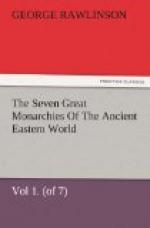Such was the theory, originally advanced by Gesenius, which, variously modified by other writers, held its ground on the whole as the established view, until the recent cuneiform discoveries. It was, from the first, a theory full of difficulty. The mention of the Chaldaeans in Job, and even in Genesis, as a well-known people, was in contradiction to the supposed recent origin of the race. The explanation of the obscure passage in the 23d chapter of Isaiah, on which the theory was mainly based, was at variance with other clearer passages of the same prophet. Babylon is called by Isaiah the “daughter of the Chaldaeans,” and is spoken of as an ancient city, long “the glory of kingdoms,” the oppressor of nations, the power that “smote the people in wrath with a continual stroke.” She is “the lady of kingdoms,” and “the beauty of the Chaldees’ excellency.” The Chaldaeans are thus in Isaiah, as elsewhere generally in Scripture, the people of Babylonia, the term “Babylonians” not being used by him; Babylon is their chief city, not one which they have conquered and occupied, but their “daughter”—“the beauty of their excellency;” and so all the antiquity and glory which is assigned to Babylon belong necessarily in Isaiah’s mind to the Chaldaeans. The verse, therefore, in the 23d chapter, on which so much has been built, can at most refer to some temporary depression of the Chaldaeans, which made it a greater disgrace to Tyre that she should be conquered by them. Again, the theory of Gesenius took no account of the native historian, who is (next to Scripture) the best literary authority for the facts of Babylonian history. Berosus not only said nothing of any influx of an alien race into Babylonia shortly before the time of Nebuchadnezzar, but pointedly identified the Chaldaeans of that period with the primitive people of the country. Nor can it be said that he would do this from national vanity, to avoid the confession of a conquest, for he admits no fewer than three conquests of Babylon, a “Midian, an Arabian, and an Assyrian.” Thus, even apart from the monuments, the theory in question would be untenable. It really originated in linguistic speculations, which turn out to have been altogether mistaken.
The joint authority of Scripture and of Berosus will probably be accepted as sufficient to justify the adoption of a term which, if not strictly correct, is yet familiar to us, and which will conveniently serve to distinguish the primitive monarchy, whose chief seats were in Chaldaea Proper (or the tract immediately bordering upon the Persian Gulf), from the later Babylonian Empire, which had its head-quarters further to the north. The people of this first kingdom will therefore be called Chaldaeans, although there is no evidence that they applied the name to themselves, or that it was even known to them in primitive times.




